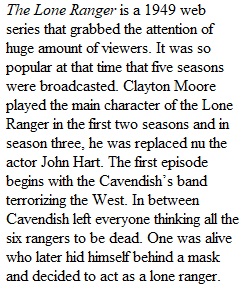


Q Please view the background lecture before posting to this assignment (see below). Ideally, please set two deadlines as per my lecture, and post a 350+ word response and then post significant responses to 3+ of your peers’ postings. Lecture Link: https://cuboulder.zoom.us/rec/share/zEU0Z52jvA1kUpjdPHNLrSJPleLZ8Odv23nSIIAc4H2xJZQaWyLHcVeS8d1eiHIS.lLSZDdHETqMDEnEA Passcode: =Kf32p!T Be sure to log into your CU Boulder Zoom account to view the lecture. Having watched these three episodes of The Lone Ranger, does the white hero’s identity being cloaked in mystery (and association with illegal behavior) change the way we view him? Specifically, does the "masked man's" origins set up different parameters or norms for how we view his relationship to his Indigenous sidekick, or is legal liminality normative for settler colonialism? How does the dialogue, costume, setting, and emplotment influence our view of both the Lone Ranger and Tonto? Which filmic storytelling strategies racialize Tonto’s identity in significant ways, and how? (See Louis Giannetti’s Understanding Movies for examples) Providing an extended closereading (120-250 words), what does Tonto’s role signify within the context of either “Jim Tyler’s Past” or “Message from Abe”? How do the Lone Ranger and other characters serve to exert pressures of settler colonialism upon the main American Indian figure, meaning Tonto, in the episode’s narratology, and to what extent is Tonto able to resist settler colonial forces?
View Related Questions